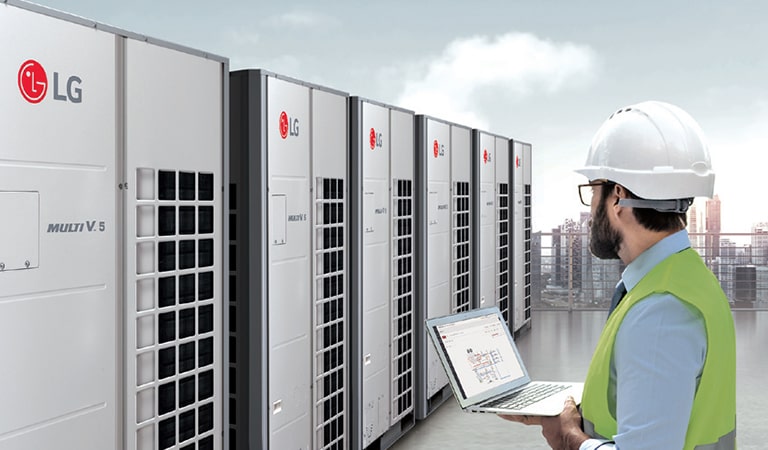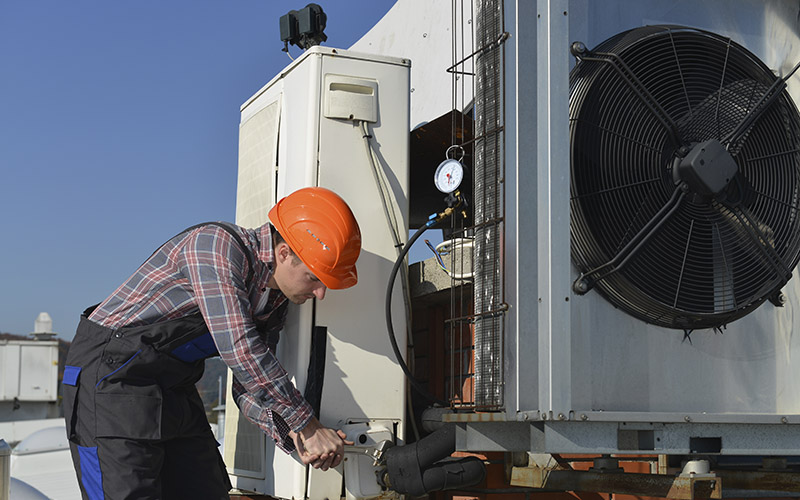Selecting Between a Heatpump and Furnace: Key Considerations for Your HVAC Requirements
When assessing heating options for cooling and heating requires, the decision between a heatpump and a heating system can be complex. Each system offers unique advantages customized to specific environments and power effectiveness objectives. Understanding these distinctions is crucial for making an educated choice. Key elements such as installation costs and ecological influence further complicate the option process. Which alternative absolutely lines up with one's convenience and sustainability preferences? The complying with sections will discover these factors to consider thoroughly.
Understanding Warm Pumps: Just How They Function and Their Advantages
While many house owners consider numerous home heating choices, understanding exactly how heatpump function and their advantages can greatly influence their decision. Heatpump operate by transferring heat instead of producing it. In the winter months, they remove warmth from the outdoors air or ground and transfer it indoors, while in the summertime, they reverse this procedure, cooling down the home by expelling heat outside. This dual performance makes them functional for year-round climate control.One of the main advantages of heatpump is their power performance. They utilize significantly less electrical power compared to standard heater, potentially causing lower energy expenses (heat pump installation ooltewah tn). Additionally, heat pumps have a smaller sized carbon footprint, making them an environmentally pleasant option. They also call for much less maintenance than traditional systems, adding to long-term price savings. Overall, recognizing the technicians and advantages of heatpump can aid homeowners make educated decisions concerning their heating and cooling needs
Exploring Furnaces: Kinds, Procedure, and Benefits
Furnaces can be found in different types, including gas, electric, and oil versions, each with distinct operational mechanisms. Recognizing these differences is essential, as they affect effectiveness and home heating performance. Additionally, heating systems provide many benefits, such as regular heat outcome and integrity in chillier environments.
Kinds of Heating systems
Heating systems can differ substantially in style and operation, with heating systems being a preferred option amongst home owners. There are several sorts of heaters, each utilizing different gas resources and modern technologies. Gas heaters prevail, leveraging all-natural gas to produce warm successfully. Electric heaters, on the various other hand, utilize electric resistance to create warmth, frequently favored for their uncomplicated installation. Oil heating systems, while much less typical, are effective in areas with limited gas access (heat pump service). Additionally, condensing furnaces optimize energy effectiveness by catching and reusing exhaust gases. Each type operates with a system of heat exchangers and ductwork to distribute cozy air throughout a home. Comprehending the differences in between these furnace types is essential for educated HVAC choices
Benefits of Heating systems
For house owners seeking trusted warmth during chilly months, the advantages of furnaces are substantial. Heating systems provide constant heating, guaranteeing also temperatures throughout the home. They are especially effective in severe chilly, usually surpassing warmth pumps in frigid problems. Different types, including gas, electrical, and oil furnaces, offer versatility to satisfy diverse requirements and preferences.Furnaces additionally have a tendency to have reduced first setup costs contrasted to heatpump, making them a much more obtainable choice for lots of. Their robust layout adds to a longer lifespan, with numerous systems lasting over 15 years with correct upkeep. In addition, modern heating systems are often equipped with innovative modern technology for enhanced efficiency, which can cause minimized power bills. Overall, heating systems continue to be a trustworthy option for efficient home heating.

Power Effectiveness: Comparing Heat Pumps and Furnaces
When contrasting energy performance between heatpump and heaters, the Seasonal Energy Performance Proportion (SEER) plays a vital duty in identifying performance. Furthermore, a functional cost evaluation exposes the long-term economic effects of each system. Recognizing these variables can assist house owners in making informed choices about their heating options.
Seasonal Power Efficiency Ratio
Energy effectiveness plays an important role in the decision-making procedure in between heatpump and heaters, specifically when considering the Seasonal Power Performance Ratio (SEER) This statistics actions the cooling performance of heatpump over an entire air conditioning season, providing a standard way to assess efficiency. Higher SEER scores indicate greater power performance, equating to reduced energy consumption and lowered utility costs. In comparison, heaters are normally examined making use of the Annual Gas Utilization Effectiveness (AFUE) rating, which shows home heating performance. When comparing these 2 systems, homeowners ought to focus on SEER rankings for warmth pumps, as they directly impact overall power financial savings and environmental sustainability. A thorough understanding of SEER can significantly affect the long-term complete satisfaction and cost-effectiveness of the selected heating and cooling solution.
Operational Expense Evaluation
Understanding the operational costs related to heatpump and heaters is vital for property owners examining their choices. Warmth pumps commonly supply higher power efficiency, transforming electrical power right into warmth with very little waste. This leads to reduced month-to-month energy expenses, especially in moderate environments. Conversely, typical heating systems, especially gas models, may have lower in advance expenses yet can sustain greater operational expenditures in time due to fuel costs and efficiency ratings.Moreover, heat pumps can function as both heating and cooling systems, potentially minimizing the need for different cooling and heating devices. While initial investments for heat pumps may be higher, their lasting cost savings in energy efficiency can make them a much more affordable option for lots of households. Mindful analysis of regional power prices is necessary to establish the very best option.
Installation Prices: What to Anticipate for every Heating Unit
Installment prices for home heating systems can differ substantially between heatpump and heating systems, affecting home owners' decisions. Heatpump generally have greater ahead of time installment expenses, usually varying from $3,500 to $8,000, depending upon the system size and complexity of setup. This consists of the outdoor device, indoor handling system, and needed ductwork modifications. Alternatively, heaters tend to have lower preliminary costs, averaging in between $2,500 and $6,000, which can be appealing for budget-conscious homeowners. Nevertheless, installment costs can boost if comprehensive ductwork is required.Moreover, the choice of fuel kind for heaters-- all-natural gas, propane, or electrical-- can also impact setup prices. While heat pumps supply energy efficiency, their preliminary financial investment might prevent some purchasers. Eventually, examining installation prices alongside long-lasting savings and efficiency will certainly help property owners in making notified choices regarding their furnace.
Environment Factors To Consider: Which System Performs Much Better in Your Location
Just how do climate conditions affect the performance of heating unit? The efficiency of heat pumps and furnaces can differ substantially depending upon the neighborhood climate. In moderate environments, heatpump succeed by efficiently transferring heat from the outdoors air, making them an energy-saving alternative. Their effectiveness decreases in exceptionally cold temperatures, where they may struggle to extract enough warm. On the other hand, furnaces, especially gas models, offer regular and reputable heat despite outside problems, making them more effective in chillier regions.In locations that experience milder wintertimes, heatpump can operate effectively year-round, giving both heating & cooling. On the other hand, regions with harsh winters months frequently profit from the robustness of heating systems. Eventually, comprehending the local climate is crucial when choosing between a heatpump and a heating system, as it straight impacts their functional efficiency and total efficiency.
Maintenance Demands: Long-Term Take Care Of Warmth Pumps vs. Furnaces
While here both warmth pumps and furnaces require normal upkeep to assure peak efficiency, their details demands and treatment routines vary substantially. Furnaces typically require less frequent focus, with yearly examinations sufficing to look for gas leakages, tidy filters, and assess overall capability. Their less complex layout usually permits for simple repairs.In comparison, heatpump demand semiannual maintenance as a result of their twin duty in cooling and heating. This consists of cleansing coils, inspecting refrigerant levels, and guaranteeing that both the indoor and exterior units operate at their best. In addition, find out here warmth pump upkeep commonly involves even more complex parts, making expert servicing essential.Neglecting upkeep can cause decreased performance and raised energy expenses for both systems. Ultimately, homeowners ought to consider these long-lasting care requirements when picking in between a warm pump and a heater, as aggressive upkeep can expand the life expectancy and performance of either system substantially.
Ecological Impact: Selecting a Lasting Heating Option
The ecological effect of furnace is a crucial examination for house owners looking for sustainable choices. Warmth pumps are usually more energy-efficient than typical heating systems, as they move warmth as opposed to create it, greatly decreasing carbon discharges. By using renewable energy sources, such as air-source or geothermal heatpump, home owners can further reduce their eco-friendly footprint.On the other hand, gas furnaces release greenhouse gases and add to air pollution, though they often offer higher heat result. Nonetheless, improvements in technology have caused the development of high-efficiency furnaces that minimize emissions.Ultimately, selecting a heating unit includes weighing performance versus environmental influence. Home owners are encouraged to mirror on neighborhood energy resources and rewards for sustainable systems, ensuring a choice that lines up with both personal convenience and environmental obligation. The decision influences not just immediate comfort yet also lasting sustainability and ecological health and wellness.
Regularly Asked Questions
The Length Of Time Do Warm Pumps and Furnaces Normally Last?
The life expectancy of heatpump commonly ranges from 15 to two decades, while furnaces can last in between 15 to 30 years. Regular maintenance significantly affects their longevity and efficiency in providing heating options.
Can I Make Use Of a Heat Pump in Incredibly Cold Climates?
Warm pumps can run in extremely chilly environments, however their performance reduces as temperatures decrease. In such conditions, additional heating sources may be necessary to keep comfortable indoor temperatures and guarantee peak performance.

What Is the Noise Degree of Heat Pumps Versus Furnaces?
The sound degrees of heat pumps and heaters vary significantly. Usually, heatpump run even more quietly than typical heating systems, making them more effective for those conscious sound, while furnaces may generate louder functional sounds during home heating cycles.
Are Warmth Pumps Suitable for Both Heating & Cooling?
Warm pumps are indeed ideal for both cooling and heating (heat pump installation ooltewah tn). They function by moving heat, providing efficient temperature control year-round, making them a functional selection for homeowners looking for an all-in-one a/c remedy
What Size Heating Unit Do I Need for My Home?
Figuring out the proper dimension home heating system for a home requires examining variables such as square video footage, insulation high quality, local environment, and the home's design. Consulting a specialist can guarantee an exact assessment and excellent convenience. Heat pumps typically use greater energy performance, transforming electric power into warmth with very little waste. In moderate environments, warm pumps excel by efficiently transferring warm from the outdoors air, making them an energy-saving alternative. Conversely, furnaces, especially gas designs, offer reputable and constant warmth visit this site regardless of exterior problems, making them more suitable in chillier regions.In locations that experience milder wintertimes, heat pumps can run efficiently year-round, providing both heating and cooling. Warmth pumps are normally more energy-efficient than standard heaters, as they transfer heat instead than create it, greatly lowering carbon exhausts. By using renewable power sources, such as air-source or geothermal warm pumps, homeowners can even more minimize their environmental footprint.On the various other hand, all-natural gas heaters produce greenhouse gases and contribute to air contamination, though they commonly offer higher warm output.